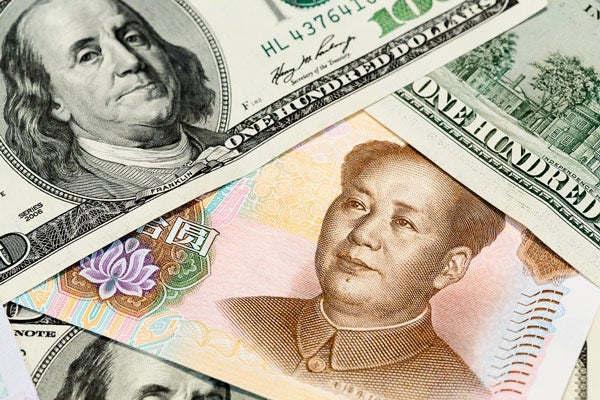|
June 6, 2014
China caught in a currency conundrum, Stanford economist says
Stanford economist Ronald McKinnon argues that China is caught in a currency trap because of its own savings surplus, the U.S. fiscal deficit and near-zero interest rates on dollar assets. As a result, China cannot at this time move toward a more market-driven economy with liberalized interest rates and private banking. By Clifton B. Parker

In a new research paper, economist Ronald McKinnon says he doesn't believe China is a currency manipulator, but it is in a currency trap. (Photo: Shutterstock) Until the global economy improves dramatically, China's policymakers will have no easy way out of their currency trap, argues a Stanford economist.
In a new research paper, Ronald McKinnon, professor emeritus of economics, concludes that China is hostage to its own savings surplus – and the United States' lack of savings – and almost-zero interest rates on dollar assets.
"Although fully liberalizing China's domestic financial markets and 'internationalizing' the renminbi – China's national currency – may be possible one day, that day is far off. For now, if China tries to liberalize its financial markets, hot money will flow the wrong way – into the economy, rather than out," wrote McKinnon, the William D. Eberle Professor of International Economics, Emeritus, and a faculty member at the Stanford Institute for Economic Policy Research.
"There is no easy way out of China's trap with the U.S. running large [fiscal] saving deficits and keeping interest rates near zero," he said in an interview. An estimated two-thirds of China's reserves are held in U.S. dollar-denominated assets.
Speculative capital flows are called "hot money" because they can move very quickly in and out of markets, quite often causing market instability. And the "liberalization" of an economy refers to steps toward a more market-driven economy, including plans to liberalize interest rates and the establishment of private banks.
Global pressure
McKinnon noted that China has been under constant pressure from foreign governments to revalue its currency in the "mistaken belief" that a stronger currency would reduce China's large trade (saving) surplus. In late February, an unexpected weakening of the renminbi "sparked a global furor" while revealing another fault line in China's currency dilemma, he noted.
"With short-term interest rates in the United States near zero, and the 'natural' interbank interest rate in faster-growing China at near 4 percent, an expected 3 percent appreciation, for example, translates into an 'effective' interest-rate differential of 7 percent," wrote McKinnon. "This is an enticing spread for currency speculators who borrow in dollars and circumvent China's capital controls to buy renminbi assets."
He said the temporary small depreciation of the renminbi in early 2014 was aimed at disrupting the profits of currency speculators to make them less aggressive.
As McKinnon wrote, China must maintain controls on inflows of financial capital for the time being to curb hot money inflows, with their central bank intervening to stabilize the renminbi's dollar exchange rate and to build up dollar claims – largely U.S. Treasury Bonds – that finance its saving surplus.
Consequently, China is trapped into maintaining exchange stability to avoid a flood of foreign exchange inflows that would threaten inflation and asset price bubbles, he asserted.
"For now, if China tries to liberalize its financial markets, hot money will flow the wrong way – into the economy, rather than out," wrote McKinnon, whose 2013 book, The Unloved Dollar Standard: From Bretton Woods to the Rise of China, includes more detail on his analysis on the U.S. and Chinese financial situations.
American connection
As McKinnon has described, China's hot money problem is exacerbated by global pressure from Western economists and politicians for further renminbi revaluation.
"In reality, the trade imbalance reflects the difference between China's large savings surplus and the even bigger U.S. saving deficiency – largely explained by the U.S. fiscal deficit," he wrote.
As McKinnon noted, the producer price index – the best measure of tradable-goods prices in China – has been falling by about 2.5 percent annually, which suggests that the renminbi may even be slightly overvalued.
How does China's currency trap affect the American economy and people?
"It allows the U.S. federal government to run large fiscal deficits without having to increase interest rates. The U.S. welfare state can then grow much more rapidly because China buys so many Treasury bonds," he said.
McKinnon does not believe China is a currency manipulator. Some Western critics have accused China of keeping its currency artificially low by hoarding foreign reserves, in order to give Chinese exports an advantage over competitors.
"But it is in a currency trap," he said.
For more Stanford experts in economics and other topics, visit Stanford Experts.
-30-
|